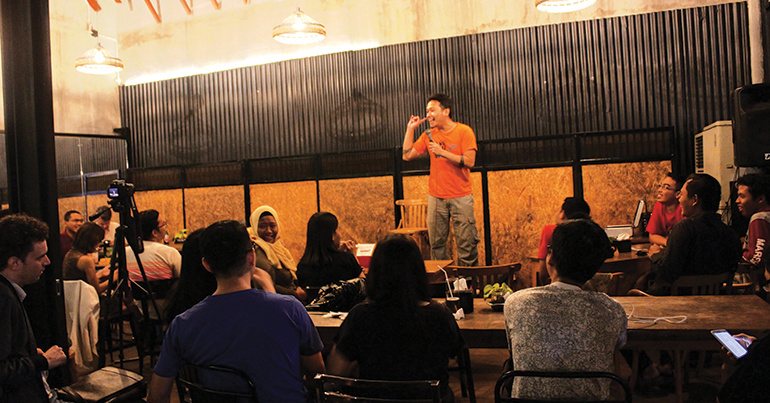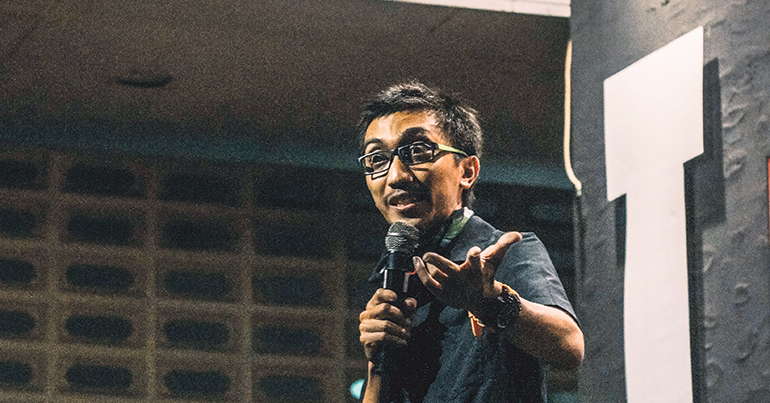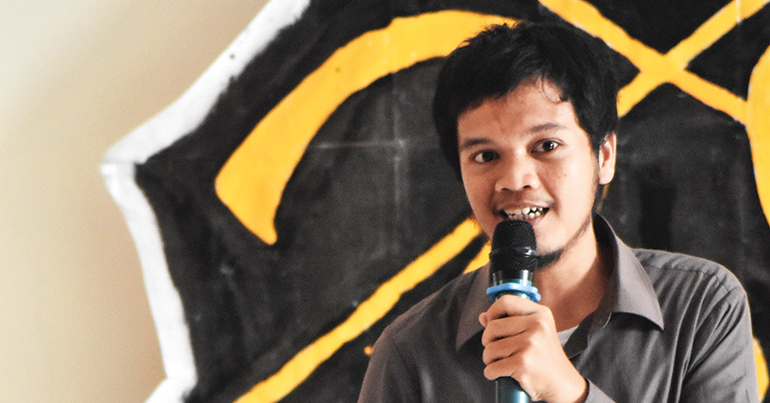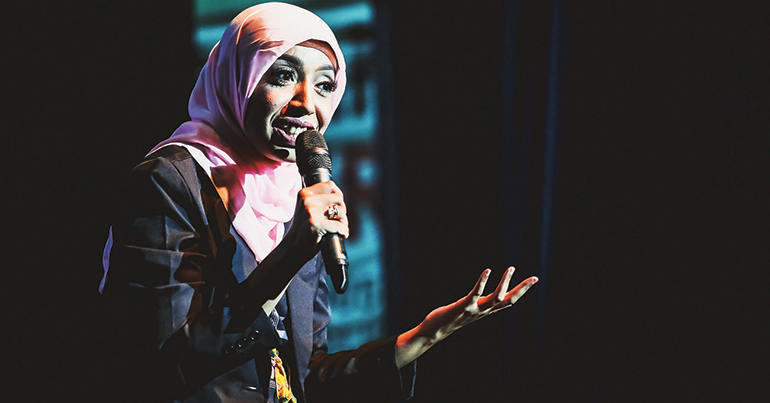Cheers, whoops and enthusiastic applause accompany Iqbal Muzakki as he shuffles off stage. The night’s MC bounds onto the platform in his place, keeping the energy of the show high: “How about Muzakki, everyone? He killed it, right?” There’s a strong “yes” from the audience. “And you know what?” the MC continues, “This is the only place where a Muslim can kill successfully… and nobody actually dies.”
This is Keminggris, a live, English-language, stand-up comedy show in Malang, the second-largest city in Indonesia’s East Java province. In a modern, open-air bar, the show’s eight performers deliver two hours of very funny, but often brutal, material that holds nothing sacred. From Chinese parents to Indian farmers; Indonesian politicians to Zumba-loving pensioners, nobody is safe from ridicule.
But in the world’s most-populous Muslim country, it is the religious jokes that stand out from the rest. Indonesia’s reputation as a moderate, secular democracy has taken a bit of a battering in recent times. Religious intolerance is on the rise, and many in the country feel free speech is under threat. For the past two years, the national debate has become increasingly dominated by the right-wing Islamist group, the Islamic Defenders Front (FPI). FPI members have been accused of violent attacks on religious minorities, intimidation of journalists and targeted online abuse.
There have been many calls for the group to be banned as the country’s religious fault lines widen, but a number of young Indonesians are attempting to fight back and help heal the damage through comedy. Muzakki, a student at the Islamic University in Malang, filled his set with jokes about a failed attempt to turn him into a suicide bomber at school and his mistaken belief that he could buy halal beer. He says he wants to “fix” how Islam is increasingly portrayed in the country.
“[The idea] that Islam is a strict authority – it’s not like that, you can have a sense of humour like me,” he says. “I just want to show that to other people, especially non- Muslims. Islam is not dangerous.”

The use of comedy to help effect social or political change is not a new idea, but it’s still at a fledgling stage in Indonesia. In fact, stand-up comedy itself has a relatively short history in the country. Indonesian humour had long tended to favour comedy troupes performing sketches and physical comedy skits; it wasn’t until the mid-2000s that a few pioneering stand-ups began to make some headway, first in Jakarta and then at national level.
The scene exploded in 2011, when two television channels ran stand-up comedy talent shows that garnered a big national audience. One of those shows, Stand Up Comedy Indonesia, on Kompas TV, is still running and still popular. Most of Indonesian comedy’s biggest names have won or appeared on the show.
Despite its popularity, many comedians have found television a difficult medium for pursuing edgier social and political comedy. “In TV shows, the censorship is quite severe,” says Reggy Hasibuan, the organiser and MC of Keminggris. “No political jokes, no ethnicity jokes and especially no religious jokes. I think personally that has reduced the quality of [Indonesian] comedy because only safe material goes through.”
Is it going to be dangerous? Is it offensive? I think before I go to the stage. But why should I feel afraid of it? My religion is funny
Under an umbrella organisation known as Stand Up Indo, there are now more than 30 stand-up comedy ‘communities’ across Indonesia. Many comics are students or part-time performers, but while the audiences are generally good, the money generally isn’t. Despite the financial restraints, it is live shows where comedians can hone their craft and, more importantly, really get their teeth into risky material.
In Malang, Fajar Ardiansyah says he doesn’t set out to deliberately offend anyone, but he believes the best way to deal with social problems is through comedy. “I never touch any kind of personal belief,” he says. “I make sure that everything I deliver is being considered by my comic friends. Is it going to be dangerous? Is it offensive? I think before I go to the stage. I consider everything. But why should I feel afraid of it? My religion is funny.”
“We need to be honest,” says Hasibuan. “If you’re living in this country and you don’t have any problems with religion, then you’re a liar, because it’s everywhere. We’re just wrapping that up in a funny way, so it’s easier to accept. Religion is not absolute; you can make fun of it and it’s OK. We have always had a problem with extremism; it’s always there. But I think what’s hopeful is that now we see people fighting back. They’ve had enough; they’ve arrived at that boiling point at which they think something must be done.”

The comics admit they still have a long way to go before their dissent drowns out the voices of Indonesia’s emboldened hardline Islamic groups. They also think that what they are doing carries a risk far greater than just causing offence. The current climate in Indonesia does not easily allow for anybody to speak out about tense religious issues, particularly non-Muslims.
A survey earlier this year by the Wahid Foundation found that nearly 40% of respondents from across Indonesia were “intolerant” towards non-Muslims. In May, this intolerance reached fever pitch when, after weeks of FPI mass rallies demanding his arrest, the ethnic Chinese and Christian governor of Jakarta was found guilty of violating Indonesia’s strict blasphemy law. Basuki Tjahaja Purnama, better known as ‘Ahok’, was sentenced to two years in prison after he referred to a Qur’anic verse in one of his speeches. His conviction followed a bitter gubernatorial election campaign in which religious identity was a major issue. Human Rights Watch called the verdict a “frightening future” for moderates and non-Muslims.
Hasibuan is himself half-Chinese and from a Christian family, though he now considers himself an atheist. He has been subjected to abuse and violent threats online after he posted a promotional flyer for a show he called Halal Christmas. Nothing happened, but he was concerned enough to put security on the door of the show, something he hadn’t done before. He is also well aware of the potential legal risks.
“Its an absolute no-no in this country to speak, make fun of, or ridicule people from different religions,” he says. “If a Christian makes a joke about Muslims, that will go bad very fast.”
Doing the shows in English helps protect him and the other performers, “because bigots are generally stupid and don’t understand English, right?” he says with a laugh.
But he also closes the show by imploring the audience not to post any videos online – “or we’ll all end up in jail!”
It’s difficult for performers to balance risk versus reward. Posting material online exposes them, but it’s also one of the few ways to gain national and international attention outside the constraints of television.

One of the most high-profile comedians in Indonesia is Sakdiyah Ma’ruf. She is one of the few comics who have gained international recognition and also one of a limited number of women on the standup comedy circuit.
Ma’ruf grew up in a very conservative Muslim family of Arab descent in northern Java. She says she was expected to grow up as a “decent Muslim girl” and eventually be married off to an older man. Much of her comedy focuses on her upbringing and the treatment of women in conservative Muslim families. Some of her most provocative material is easy to find online. During a TED Talk in Bali last year she told her audience: “In my community, people work fucking hard to pretend they still live in the desert.”
In 2015, Ma’ruf was awarded the Vaclav Havel Prize for Creative Dissent in Oslo – previous winners include Ai Weiwei and Aung San Suu Kyi – but her profile has also attracted vitriol from inside Indonesia.
“I cannot have that in the back of my mind if I want to continue working,” she says. “I know that there’s a danger. I don’t want to go to jail or receive death threats. I cannot allow myself to get scared of that. It’s hard enough to write jokes that work; it’s going to be even harder if I have to self-censor.”
Though Ma’ruf describes herself purely as a comedian, she, like the others, feels a greater purpose in what she is trying to do. “Comedy has the potential to combat extremism because it creates a safe space for everyone to discuss their issues. But, for me personally, the most important thing is to be able to talk honestly about how human we are, that we are all flawed.”

Recalling her last television appearance a few years ago, Ma’ruf says she was repeatedly reminded that the programme was live. The warning being: don’t say anything controversial.
“What am I going to say?” she laughs. “What are they so worried about? I’m just a girl in a hijab. It’s not that dangerous.”


